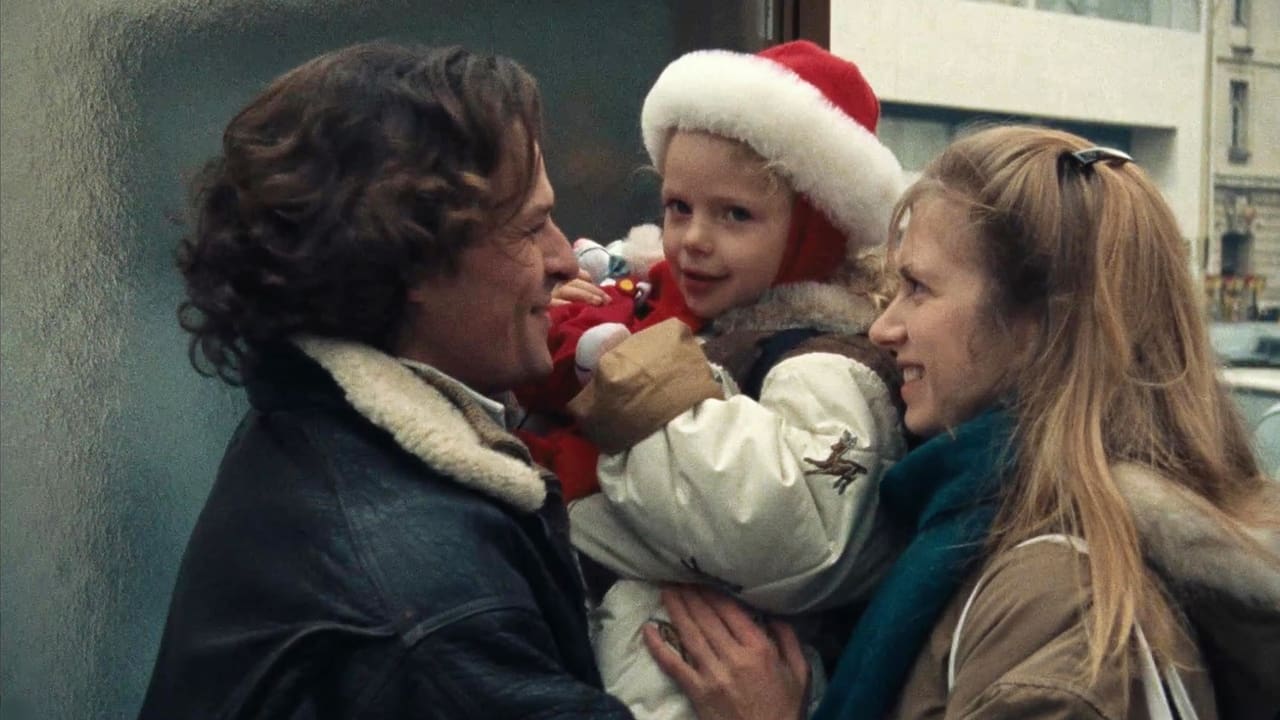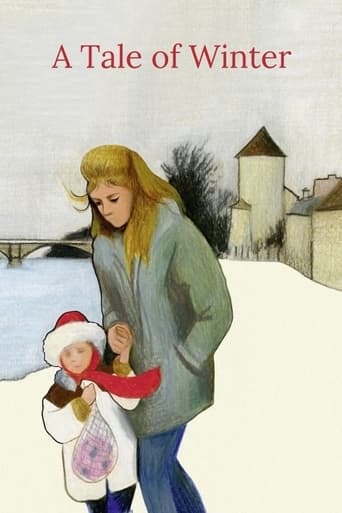



Wow! Such a good movie.
This is one of the few movies I've ever seen where the whole audience broke into spontaneous, loud applause a third of the way in.
View MoreThe movie's neither hopeful in contrived ways, nor hopeless in different contrived ways. Somehow it manages to be wonderful
View MoreIt's a movie as timely as it is provocative and amazingly, for much of its running time, it is weirdly funny.
View MoreFelicie and Charles have a serious if whirlwind holiday romance. Due to a mix-up on addresses they lose contact, and five years later at Christmas-time Felicie is living with her mother in a cold Paris with a daughter as a reminder of that long-ago summer. For male companionship she oscillates between hairdresser Maxence and the intellectual Loic, but seems unable to commit to either as the memory of Charles and what might have been hangs over everything.Film critic Roger Ebert added A Tale of Winter to his Great Movies series in 2001, writing, "What pervades Rohmer's work is a faith in love--or, if not love, then in the right people finding each other for the right reasons. There is sadness in his work but not gloom." Respectfully, the film did not do for me what it did for Ebert. I loved the way it incorporated Shakespeare, which is the source of the film's title, but overall found it rather bland. A straight romance-drama tends to be bland, but that is no excuse for my boredom.
View MoreTale of Winter is a good effort by Rohmer, though not his best by any means. Basically, the story is about Felicie, a Parisian beautician, who has a torrid romance with a man called Charles during one summer. Unfortunately, at the time of saying goodbye to each other, Felicie inadvertently gave Charles a wrong address, so they are unable to meet again. The movie then moves on to five years later, and what remains of that romance is a photo of Charles and a five year old daughter born of that fleeting relation. Felicie is at the moment having to decide between two boyfriends: Loic, a Catholic intellectual, or Maxence, a somewhat older hairdresser. She is undecided on whom to choose, longing instead for Charles to reappear in her life, but that would take a miracle, right? Or at least a deus ex machina as in the titular Shakespeare play. Her indecisiveness recalls us the character played in "Le Rayon Vert" by Marie Riviere (who has a cameo role in a crucial scene here). The problem is that the protagonist is not very likable. She is pretty, but she is also tiresome and somewhat unstable, and the spectators may at times not be going through very pleasant times. And while there is a happy ending, it's not terribly convincing given the circumstances.
View MoreI just got a chance to see this movie after seeing all other Rohmer's movies I could get my hands on. After seeing it, I must say it's a superb Rohmer, one of his best, certainly the most accomplished of his Four Seasons, highly reminiscent of My Night With Maud, which still remains my favorite film of the perpetually youthful director. Here you will also find a philosophical discussions on the nature of beauty, love, Pascal's wager (familiar item for a Rohmerian, isn't it?), discussion on personal ('intimate') vs. Catholic faith, the immortality of soul. Of course, the heavy doses of philosophy are beautifully integrated into the film, just like in Maud. These discussions seem organical, natural -- the characters really mean what they say here. Like one character said to the main heroine, "You're articulate, because you let your feelings talk" and "I love you because I can read your heart", even if the heroine seemingly has a change of heart every 5 minutes :) I must applaud the lead actress(who's also a great beauty) for her heartfelt, genuine performance. I felt like I knew this woman somewhere before, that I could understand her every action and her every thought. The film is also bittersweet, like a many Rohmer films, yet in this film the melancholy feeling is more pronounced, somewhere on par with 'My Night with Maud'. It also reminded me of Richard Linklater's "Before Sunrise"; this film beautifully depicted what feelings Linklater's Jesse and Celine might've had during those long 9 years of separation -- the feelings of longing, of hope, of great joy they'd find in meeting each other again, of "the joy so great it'd be worth giving your life for", in the main heroine's words.What else to say -- I loved these people, they felt real, genuine, and above all hopeful and blessed by love. I loved Felicie and her absent Charles as much as I loved Rohmer's Maud and Jean-Louis, Linklater's Jesse and Celine, David Lean's Laura and Alec -- that is to say a lot. By the end of the movie they've become my friends.
View MoreSecond chapter of Rohmer's Tales Of The Four Seasons (before filming Winter's Tale he made Spring's Tale). This time the french director tells us the story of Felice, a girl in the search of her soul mate. Actually she had found him in some holidays, his name was Charles, and she got pregnant, but at the end of that summer of joy and love she gave him a wrong address... so she never saw his love again and couldn't locate him either. Five years after she's living in Paris, at her mother's house, with her daughter and she's going out with two different men, although she's not in love with none of'em. She can't love anyone but Charles. Will she ever find the lost love of her life? Does she believe in miracles? That's something we'll find out as we watch this Rohmer's film.Gene Hackman said in some movie that "watching a Rohmer's movie is just like watching a plant grow". Obviously that'll be the opinion of most of the people (especially those who enjoy themselves watching Steven Seagal or Van Damme's movies); but there's something else in cinema (and in life) as well as kicks, guns, explosions, and parties. What about feelings, reflexions, love, doubts, philosophy? That's what Eric Rohmer seems to care about, and that's what he usually talks about in his movies. Ordinary people, living ordinary lives, with their ordinary problems, and their ordinary conflicts. In some way he's such a "voyeur": he puts his camera in some corner of the room and lets the characters express themselves. How they feel, what do they expect from life, what are their dreams, their fears... I think that's why he usually works with unknown actors and actresses: that way the audience feels like they're watching a completely unknown talking or crying, or laughing. I would not work the same if he picked Gerard Depardieu or Juliette Binoche for this sort of movies. Also he uses a literary language in the dialogues (dialogues, the base of Rohmer's cinematography), though his movies show ordinary situations the people in there definitely doesn't talk like normal people. Some may say that's a handicap, that people doesn't talk about existence and the meaning of life when they're having a coffee in some coffee-shop; but when I want to hear real-life dialogues with real-life sentences, rough language, and so I just go and watch some Tarantino movie. I wouldn't recommend Rohmer's movies to anyone; 'cause I assume that movies such as Winter's Tale may result boring for many people. So I only recommend this movie (and the rest of Tales of the Four Seasons) to those who look for something else in cinema and (again) in life apart from hollow entertainment.My Rate: 8/10
View More